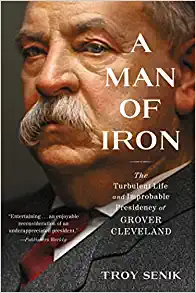Which U.S. Presidents have won the popular vote at least three times? Of course, Franklin Delano Roosevelt holds the record for four (1932, 1936, 1940, 1944). but there have been two others: Andrew Jackson (1824 before also winning the Electoral College and becoming President in 1828 and 1832), and Grover Cleveland (becoming President in 1884, winning the popular vote but losing the presidency in 1888, then regaining the office in 1892).

Grover Cleveland had a most remarkable career, going from an attorney in private practice to mayor of Buffalo, NY to the governor of New York to a major-party candidate for President in only three years. How did he accomplish this? As a workaholic man of uncommon integrity in an era known for corruption, he was the right man at the right time. Some have called it the “Cleveland luck,” but that is a disservice.to the man’s principles.
Not that it was easy. The 1888 campaign against Republican James G. Blaine and two third-party candidates was particularly ugly. Cleveland was beset with (probably true) accusations of fathering a child out of wedlock; some things never change. Then marrying the 21-year-old daughter of a deceased friend (he was 47) after having served as the estate’s executor and supervised the girl’s upbringing did little to tamp down the gossip. By the way, his has been the only wedding in the White House.
So why are the Cleveland presidencies largely forgotten? Perhaps the biggest reason can be found in the Afterword of Tony Senik’s recently released biography A Man of Iron: The Turblent Life and Improbable Presidency of Grover Cleveland. To quote —
“Virtually everything worth saying about Grover Cleveland boils down to that one elemental fact: he possessed moral courage at almost superhuman levels. He was consistently motivated by conviction, even when he knew he’d suffer political harm as a result. As Woodrow Wilson observed, “His courses of action were incalculable to the mere politician, simply because they were not based on calculation.” “
Acquire Hawaii and Cuba? Take the nation off the gold standard? Build a canal connecting the Atlantic and Pacific Oceans? Cleveland conceivably could’ve done all of those. But he chose not to because he thought they were wrong. History favors the victors and the doers, not the principled.
Tony Senik is an unabashed fan, although he pulls no punches. To quote from the Introduction —
“To be sure, this volume does not claim that Grover Cleveland had one of America’s greatest presidencies, but it does claim that, despite his many shortcomings, he was one of our greatest presidents.”
Mr. Senik writes a compelling narrative in an entertaining style, but have a dictionary handy. I guarantee you’ll learn some new words. And maybe now Grover Cleveland will assume his rightful place in history.
